Never let it be said that this series isn’t a learning experience.
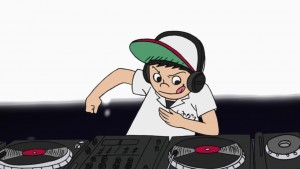 There was a lot to like in this week’s episode of Tonkatsu DJ Agetarou, but I think one has to start out with an expression of gratitude. Think back hard, now – how often have you seen anime present Koreans in Japan in a favorable light? How often have you seen anime celebrate Korean culture rather then denigrate it or (at best) ignore it? More often it’s stuff like Sakurasou having to apologize for showing a character cook a Korean dish, or Akatsuki no Yona having to put a disclaimer at the beginning of every episode because the setting is based on Korea. It may not seem like much, but a little show like this one bucking the trend is quite heartening.
There was a lot to like in this week’s episode of Tonkatsu DJ Agetarou, but I think one has to start out with an expression of gratitude. Think back hard, now – how often have you seen anime present Koreans in Japan in a favorable light? How often have you seen anime celebrate Korean culture rather then denigrate it or (at best) ignore it? More often it’s stuff like Sakurasou having to apologize for showing a character cook a Korean dish, or Akatsuki no Yona having to put a disclaimer at the beginning of every episode because the setting is based on Korea. It may not seem like much, but a little show like this one bucking the trend is quite heartening.
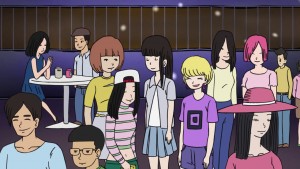 We get to that in a rather roundabout way, the major theme being Agetarou wrestling with something every artists who’s trying to succeed professionally has to wrestle with – do they stay true to their own sensibility, or do they g against it and give the audience what they want? When Agetarou takes on what’s basically a corporate gig, he inherits a floor full of young millennials who aren’t into the old-school tracks he lays down. They want something with drive and a beat that’s easy to dance to, and of course that’s EDM (even I’ve heard of that), which the follow-up act – young Korean DJ E. Dong Myeong, happily serves up with great results.
We get to that in a rather roundabout way, the major theme being Agetarou wrestling with something every artists who’s trying to succeed professionally has to wrestle with – do they stay true to their own sensibility, or do they g against it and give the audience what they want? When Agetarou takes on what’s basically a corporate gig, he inherits a floor full of young millennials who aren’t into the old-school tracks he lays down. They want something with drive and a beat that’s easy to dance to, and of course that’s EDM (even I’ve heard of that), which the follow-up act – young Korean DJ E. Dong Myeong, happily serves up with great results.
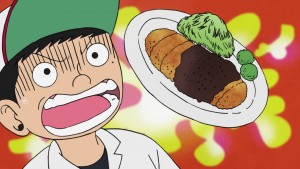 This is a tricky subject, because as a performing artist, Agetarou isn’t truly succeeding if he isn’t connecting with his audience. Yet of course if he isn’t genuine, that will eventually show through – not to mention dull his love for being a DJ. You can’t make people eat tonkatsu if they want yakiniku (and apparently EDM people are yakiniku people). So what’s a struggling young DJ to do?
This is a tricky subject, because as a performing artist, Agetarou isn’t truly succeeding if he isn’t connecting with his audience. Yet of course if he isn’t genuine, that will eventually show through – not to mention dull his love for being a DJ. You can’t make people eat tonkatsu if they want yakiniku (and apparently EDM people are yakiniku people). So what’s a struggling young DJ to do?
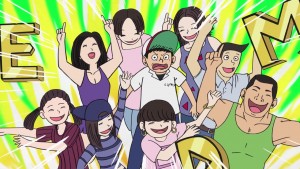 The answer Agetarou arrives at he does so by pure chance: he goes into a yakiniku-ya and hears the proprietress chopping daikon to the beat of ppongjjak. If you say you knew what that was I’m going to suspect you’re lying, but I sure didn’t – and apparently it’s like “Korean enka” (which, as it happens, would be an explanation of no use to about 95% of the American public). This populist Korean music speaks to Agetarou, and the next time he takes a corporate gig he sets the audience up with EDM and knocks them down with ppongjjak. It’s so successful that even E. Dong Myeong is dancing – and crying, as it reminds him of his mother in Seoul (for a Japanese series to acknowledge that Koreans not only have mothers but love them is a major breakthrough). And so a new friendship is formed – may it serve as inspiration for others…
The answer Agetarou arrives at he does so by pure chance: he goes into a yakiniku-ya and hears the proprietress chopping daikon to the beat of ppongjjak. If you say you knew what that was I’m going to suspect you’re lying, but I sure didn’t – and apparently it’s like “Korean enka” (which, as it happens, would be an explanation of no use to about 95% of the American public). This populist Korean music speaks to Agetarou, and the next time he takes a corporate gig he sets the audience up with EDM and knocks them down with ppongjjak. It’s so successful that even E. Dong Myeong is dancing – and crying, as it reminds him of his mother in Seoul (for a Japanese series to acknowledge that Koreans not only have mothers but love them is a major breakthrough). And so a new friendship is formed – may it serve as inspiration for others…


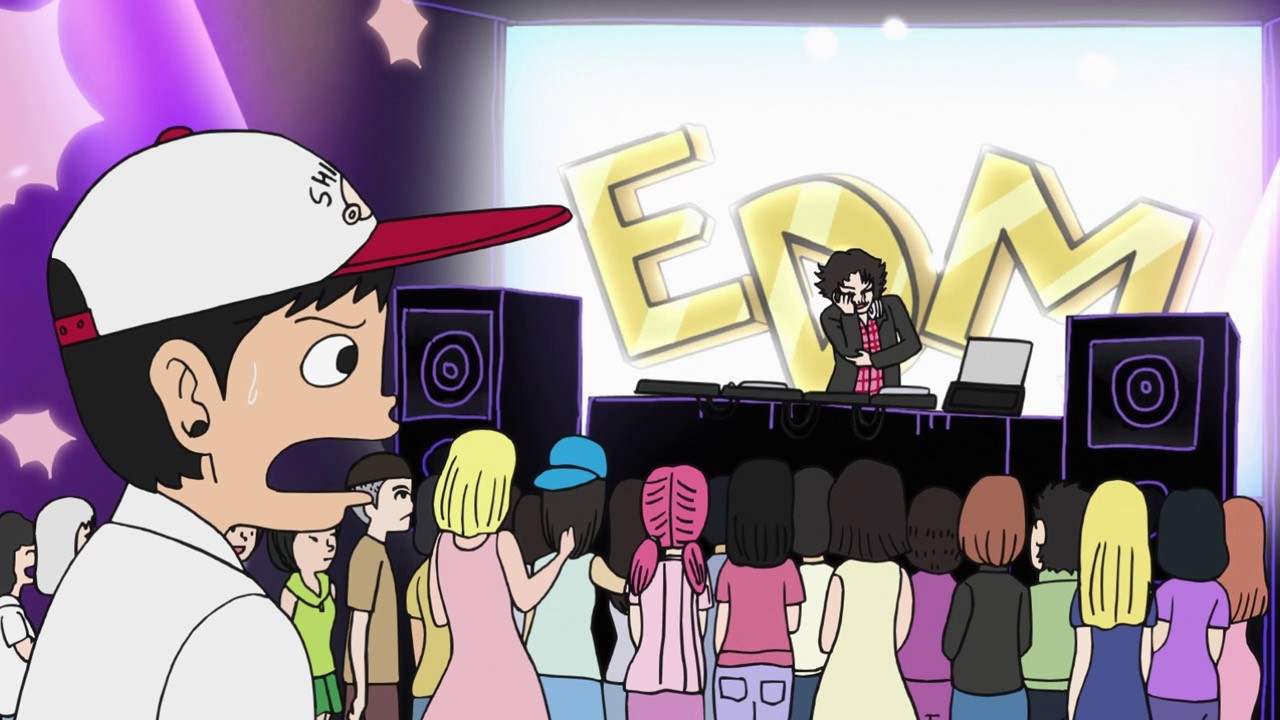
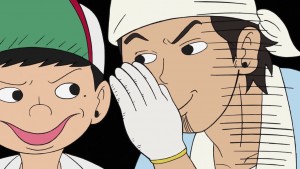

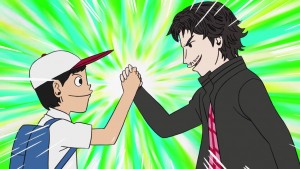
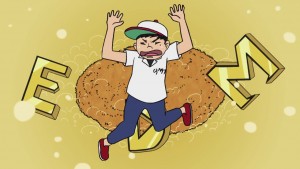
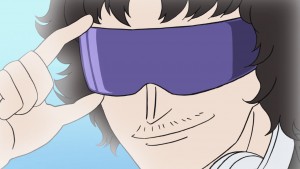
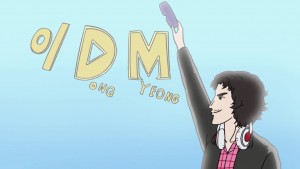
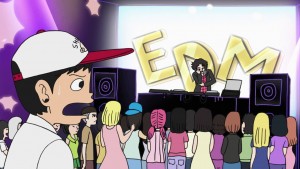
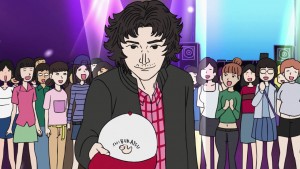

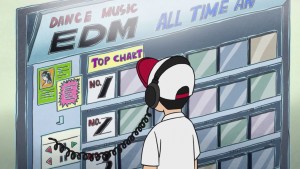
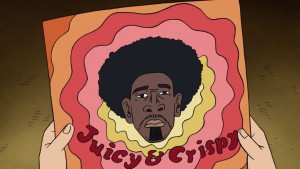

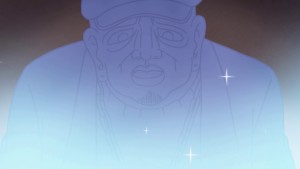
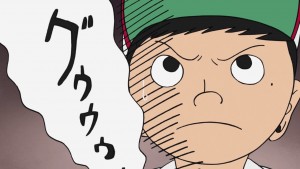
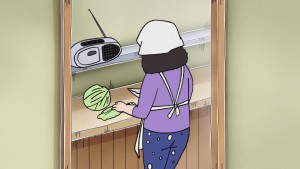
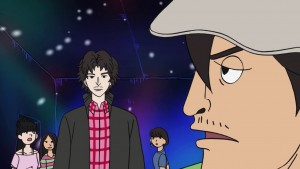

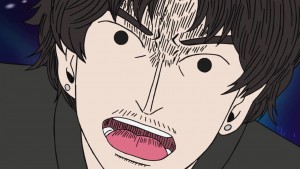
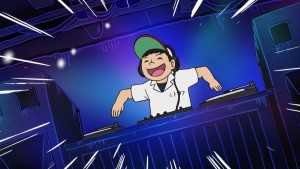
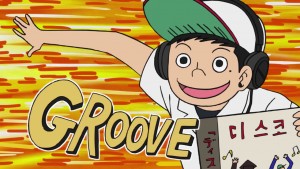
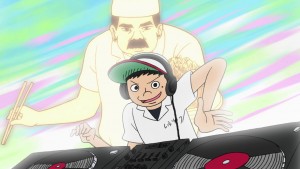
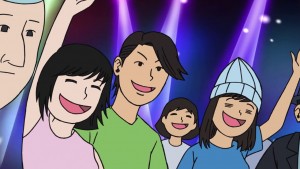
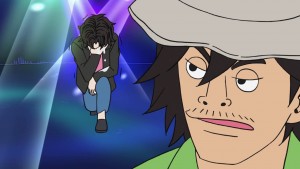
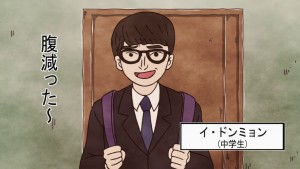

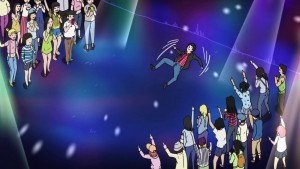
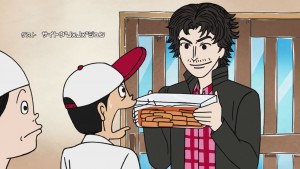


moodytot
May 30, 2016 at 8:46 pmThe Korean thing was the first thing on my mind. Really appreciate how Tonkatsu DJ can show young Japanese and Koreans getting along perfectly fine within the cultural pot that’s Shibuya (though sadly, Shibuya is also the prime spot for many radical right-wingers to hold their anti-Korean demonstrations).
I don’t comment much, Enzo, because you cover almost everything I have to say, but I really appreciate your dipping into the cultural consciousness of Japan. And tooting the horns of underappreciated anime like this and Kyoukai no Rinne.
Guardian Enzo
May 30, 2016 at 9:26 pmThanks, that’s always nice to hear. The one thing I’d say in Shibuya’s defense is that the reason it has all those demonstrations is that it’s quite multicultural, and that’s an affront to the nationalists.
elianthos
May 31, 2016 at 2:03 amI really liked this positive take on Korea-Japan relations through the power of music too. And those manly tears as music triggers childhood loving care memories…
Talking of “Korean enka” per se I only had a peripheral awareness of it via the handful of K-dramas I used to watch so it was a welcomed bit knowledge upgrade this week :D.
P.S.: this show keeps delivering on feeding meat cravings too. Meat :Q__
Dollar
May 31, 2016 at 8:04 amJust a minor suggestion – I googled “pponjjak” and came back with zero results… then I did a bit of digging and found out that the genre is more accurately spelled “ppongjjak” and is also called Trot. So maybe it would be more accurate to spell it that way?
Guardian Enzo
May 31, 2016 at 8:21 amOkay, duly noted. Let Crunchy know!
Rita
May 31, 2016 at 5:47 pmIf you told me years ago that the of all series to have such a respectful and amicable relationship between Koreans and Japanese displayed, the best would be one about a tonkatsu chef wanting to be a DJ, I probably wouldn’t have believed you. And while I’m super glad it did, I’m also very sad that this is such a rare thing that it takes such an off the radar show to pull it off without the shitstorm backlash all the higher profile shows get.
(also psst isn’t it about time you gave this series it’s own tag Enzo? I wanted to go back and read the older reviews and found that no tags = endless scrolling XD)
Guardian Enzo
May 31, 2016 at 5:56 pmYeah, I know, I know – I thought about it while I was posting it. It really is time.
And yes, the reason this show can get away with it is because it’s barely noticed by anybody. Sad, but true.
Morioh
June 3, 2016 at 5:53 pmJapan and Korea need to
CHILL~ OUT~
Hijokkle
June 4, 2016 at 7:05 amWhen this season started, I had this series on the list, but I never actually got around to it, what with Rinne, Tanaka-kun, BNHA etc. But in a spur of desperate procrastination, and knowing that you would be covering this series, I finally gave it a go.
It’s really good. I think I even like this better than Tonari no Seki-kun in terms of short anime.
To the episode itself, it was a nice change to see a depiction of positive relations between Japan and Korea, although everyone’s kind of reiterated that already. What I love about this show is that it never fails to charm me in some way. I also love the music. It’s so simple yet it just fits.